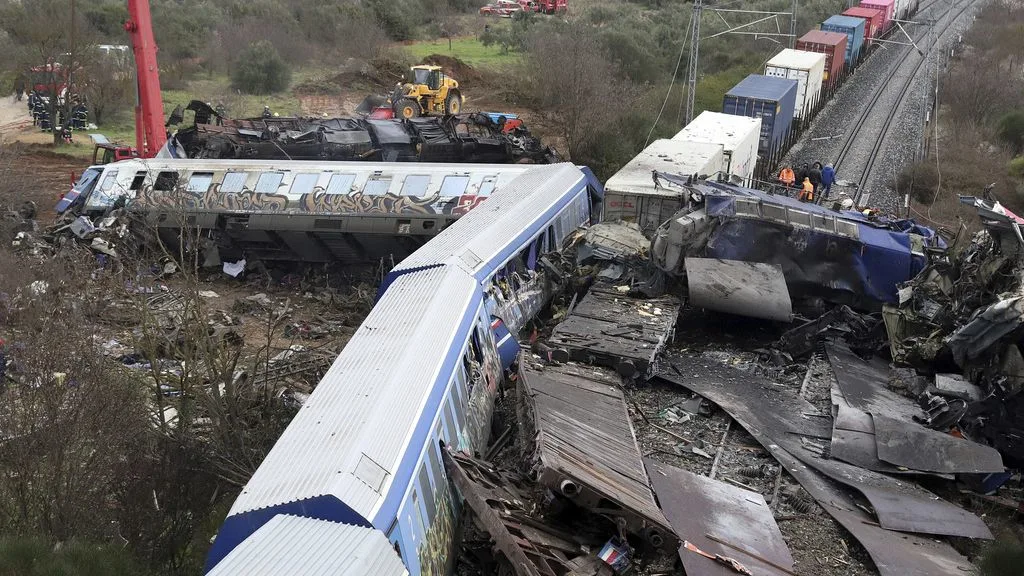Stefanos Kasselakis, leader of the newly founded “Movement for Democracy,” has emerged as a prominent voice in Greece’s evolving political landscape. His party’s recent accession to the European Democratic Party (EDP) marks a strategic alignment with broader pro-European, centrist ideals. In a critical moment for democratic accountability in Greece, Kasselakis co-hosted an event in Athens alongside the EDP, represented by Secretary General Sandro Gozi and MEP Oihane Agirregoitia from the Basque National Party (EAJ-PNV). The event centered on the rule of law and government accountability following the tragic Tempi train crash a disaster that has become a national symbol of systemic failure and institutional negligence. In the following interview, Kasselakis offers a candid and urgent critique of the state’s response, underscoring the need for transparency, justice, and structural reform.
In the aftermath of the Tempi train disaster, many have questioned the state of railway infrastructure and safety protocols in Greece. What, in your view, Mr. Kasselakis, are the key systemic failures that allowed such a tragedy to occur?
“The tragedy at Tempi was not a random incident. Despite the commitments made through European funds and programs, the train control system was either never properly installed or left incomplete. Additionally, chronic understaffing, mismanagement, and patronage-based hiring, especially within OSE and the relevant agencies, deprived the system of skilled personnel who knew what they were doing and provided accountability. The problem is systemic and inherently political. But beyond institutional failure, what followed was an orchestrated cover-up, coordinated at the highest levels of government. From the rushed cleanup of the crash site, to missing evidence, silenced experts, and the rapid blaming of a single individual, it’s clear there was political will not to uncover the truth—but to bury it. When a state engages in coordinated suppression of justice, we are no longer speaking of negligence. We are speaking of complicity.”
There were reports of long-standing warnings from rail workers and experts about safety concerns. Why do you think these warnings were not adequately addressed, and what does this say about the government’s priorities?
“The warnings were numerous, specific, and consistent. Railway workers, technicians, and union representatives repeatedly sounded the alarm. Instead of being heard, they were ignored—in some cases, even ridiculed or sidelined. The message from the government—and from successive governments—is clear: the priority was not human life, but image management, spin, and serving vested interests. The state chose not to invest in prevention, but to react once disaster had already occurred. That culture of indifference is a political choice. And when lives are at stake, there’s no room for political convenience.”

Many families are still seeking accountability and justice. Do you believe the current investigation and governmental response are sufficient, or do you see signs of institutional evasion?
“Unfortunately, the government never truly allowed the justice system to work freely. From the very beginning, there was a clear effort to shift blame, narrow the scope of responsibility, and silence those who knew the truth. In a tragedy of this magnitude—with dozens of lives lost—the fact that the full weight of blame was so quickly placed on a single stationmaster, while long-standing negligence, broken safety systems, and top-level decisions were ignored, reveals a deliberate attempt at a cover-up.
And this cover-up wasn’t theoretical. It was the rushed burial of the accident site. It was the remains of victims discovered months later, discarded in empty lots. It was crucial documents “lost,” key technicians never called to testify, and political figures evading any scrutiny.
This is not a rule-of-law state—this is a state that fears the truth.
And when a state fears the truth, there can be no real justice.
We say this clearly: no crime should go unanswered. No mother should be left wondering where her child is. No family should be forced to search through rubble for the truth.
We do not seek revenge. We seek responsibility. We demand a new social contract between citizens and the state—and it begins with a simple act: telling the truth. The whole truth. Without exceptions, without silence.”
In light of this disaster, what does the handling of the railway system tell us about the broader state of public sector management and political responsibility in Greece?
“It reveals a state without continuity, without accountability, without strategic planning. Public administration continues to operate in the logic of political clientelism. Governments change, but the same logic remains: appoint allies, remove experts, and manage public assets without transparency or long-term vision.
The railway disaster is a symptom of a deeper issue: we lack independent structures that can endure political cycles. There is no institutional memory, no stable administrative culture, and no accountability framework. The Greece of tomorrow must be built on a new foundation—one of rules, consistency, professionalism, and respect for the citizen.”

Looking forward, what concrete steps do you believe are urgently needed to ensure that such a tragedy never happens again—and why do you think these haven’t been taken sooner?
“First and foremost, the remote control and automatic braking systems must be fully reactivated and modernized across the entire rail network—not on paper, but in practice, with transparency and independent oversight.
Second, we must establish an autonomous transport safety authority, shielded from political interference, with a mandate to investigate, report, and prevent future risks.
Third, we need to invest in human capital: training, expertise, and merit-based hiring. Fourth, we should implement a digital monitoring platform for all public works and procurement, accessible to all citizens.
And above all: we need the political will to enforce accountability. Without that, all technical upgrades are meaningless. These measures have not been implemented because, for the existing system, transparency and accountability are threats—not priorities.
But we are here to change that.”











